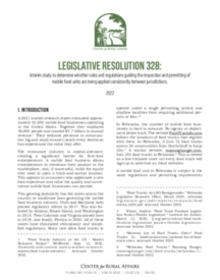A 2021 market research report estimated approximately 32,000 mobile food businesses operating in the United States. Together they employed 38,000 people and created $2.7 billion in annual revenue. Their welcome presence in communities big and small ensures nearly every American has experienced the value they offer.
The restaurant industry is capital-intensive, creating a significant barrier for first-time entrepreneurs. A mobile food business allows entrepreneurs to introduce their product to the marketplace, and, if successful, build the equity they need to open a brick-and-mortar location. This appeals to consumers who appreciate a new food experience and value the quality and convenience mobile food businesses can provide.
This growing popularity has led states across the country to modernize laws governing the mobile food business industry. Utah and Maryland both passed regulatory reform in 2017. This was followed by Arizona, Rhode Island, and Washington in 2018. Then Colorado and Virginia passed laws in 2019, and finally, Florida in 2020. All of these states have eliminated redundancy and simplified regulations. Many now allow food trucks to operate under a single permitting system and disallow localities from requiring additional permits or fees.
Lending
Small Towns


